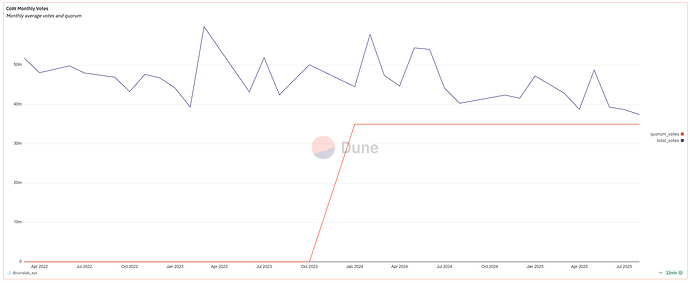Recognized Delegates were introduced on August 18th, 2024, with the aim of fostering active governance participation and consistent engagement. However, this initiative currently lacks defined responsibilities, clear KPIs, or robust tracking mechanisms to measure its impact. This has contributed to a critical challenge: low engagement within the CoW DAO forum, which is crucial for robust decentralized governance and the development of strong proposals. While recognized delegates consistently demonstrate commitment through high Snapshot voting participation, a disconnect exists, as their engagement in forum discussions, or even the publication of vote rationales, remains limited. This creates a bottleneck in the collaborative development of ideas and community consensus building. To truly make this role effective and impactful, it is imperative to establish clear goals for Recognized Delegates and implement a compensation framework that incentivizes their active contributions.
Recognized Delegate Snapshot Voting Participation (since CIP-52):
| Delegate | Proposals Voted | Participation Rate |
|---|---|---|
| Tané | 18 / 18 | 100% |
| Karpatkey | 18 / 18 | 100% |
| Chim9 | 15 / 18 | 83.3% |
| Curia Lab | 15 / 18 | 83.3% |
| Hasu | 13 / 18 | 72.2% |
| MasterMojo | 12 / 18 | 66.7% |
| middleway.eth | 11 / 18 | 61.1% |
| Stefan | 10 / 18 | 55.6% |
| yvesfracari.eth | 10 / 18 | 55.6% |
| GNSPS | 7 / 18 | 38.9% |
| Eylon Aviv | 1 / 18 | 5.6% |
| kubesqrt | 0 / 18 | 0% |
Average: 12 / 18 proposals voted (66.7%), but only a minority are engaging on the forum.
Note: cp0x.eth and Areta were recently added to the Recognized Delegates list on June 26th, 2025.
While Recognized Delegates maintain active participation in Snapshot voting, a deeper look into forum engagement reveals a different picture. The following data presents the activity of Recognized Delegates on the forum after August 2024, including replies and the delegate threads, which are a key channel for publishing vote rationales.
Recognized Delegate Forum Activity (after August 2024):
| Delegate | Replies | Delegate threads |
|---|---|---|
| Tané | 17 | 18 |
| middleway.eth | 68 | 0 |
| MasterMojo | 7 | 0 |
| yvesfracari.eth | 6 | 0 |
| Karpatkey | 9 | 0 |
| Chim9 | 23 | 0 |
| Curia Lab | 5 | 15 |
| Eylon Aviv | 0 | 0 |
| kubesqrt | 1 | 0 |
| Stefan | 0 | 0 |
| Hasu | 1 | 0 |
| GNSPS | 0 | 0 |
Note: This data is presented objectively to highlight the overall low engagement on the forum and is not intended to criticize or single out any individual delegate.
This high voting activity on Snapshot contrasts sharply with the observed lower engagement on the CoW DAO forum. To truly foster a decentralized and participatory environment, it is imperative to align forum engagement with Snapshot voting activity.
Open Questions
-What types of engagement or activity should be recognized as valuable and therefore rewarded?
-What specific types of forum engagement do the community and delegates find most valuable? -What KPIs or metrics should we use to define “active engagement”? -Should delegates be expected to publish vote rationales as a norm?
This proposal serves as a starting point to discuss how we can make the Recognized Delegates more impactful.
